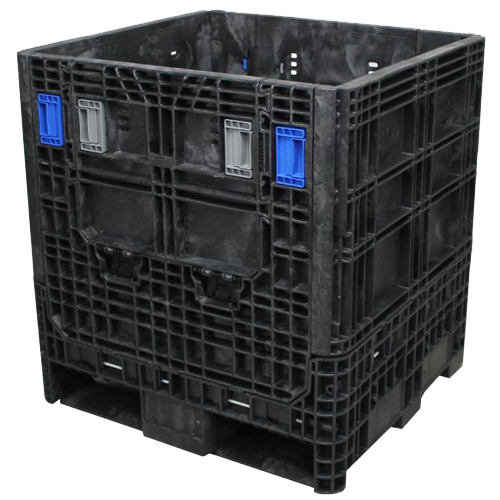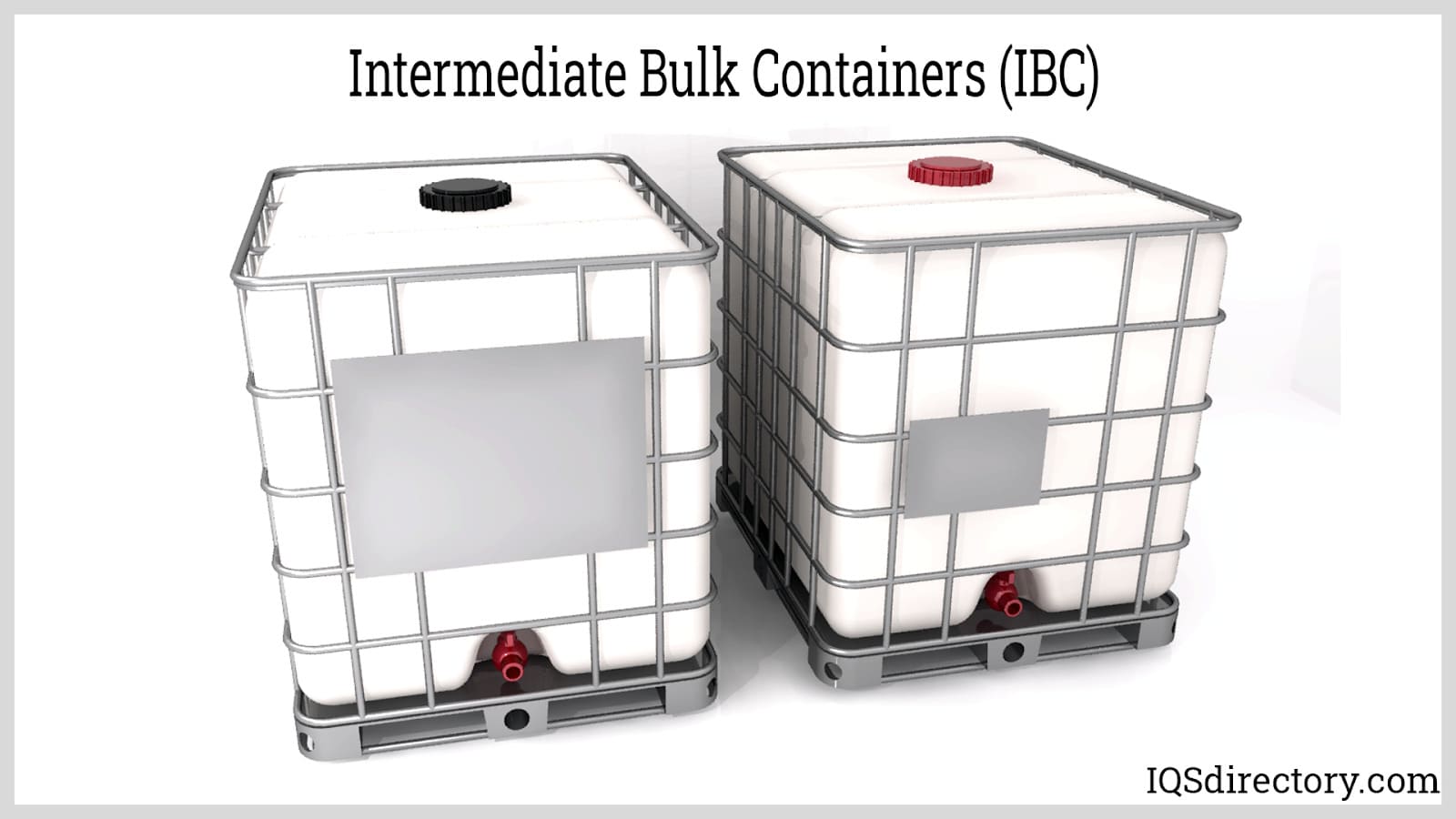The most effective plastic bulk containers for commercial applications
A Comprehensive Guide to the Various Kinds Of Bulk Plastic Containers Available Today
Bulk plastic containers play an essential function in different markets, using remedies for storage space and transport. Their diverse types accommodate various demands, from stiff options for strong products to flexible containers accommodating various shapes. Each type presents unique benefits, making it important to understand their functions and applications. As markets advance, so do the demands for effective container remedies. What elements should one think about when picking the ideal bulk container?
Overview of Mass Plastic Containers

Types of Mass Plastic Containers
Bulk plastic containers come in various kinds, each matched to details applications. Stiff mass containers, adaptable bulk containers, and intermediate bulk containers represent the main groups, each offering unique benefits. Understanding these types is vital for picking the appropriate container for transferring and keeping products.

Stiff Bulk Containers
Stiff bulk containers are vital for reliable storage space and transportation of various materials throughout industries. These containers are normally created from durable plastics, allowing them to withstand harsh handling and environmental conditions. They come in different sizes and shapes, consisting of containers, totes, and drums, making them appropriate for keeping everything from granular substances to fluids. Inflexible containers usually include strengthened walls and protected lids, ensuring the materials continue to be secured during transportation. Their stackable layout optimizes storage room, making them suitable for storehouses and making centers. Furthermore, numerous rigid mass containers are recyclable and recyclable, contributing to sustainability initiatives. Generally, their effectiveness and convenience make stiff mass containers an essential element in supply chain operations.
Adaptable Mass Containers
Versatile bulk containers, frequently referred to as flexible intermediate bulk containers (FIBCs), act as a versatile service for saving a variety and delivering of completely dry products. These containers are typically made from woven polypropylene and are developed to be lightweight yet strong, enabling for reliable handling and piling. Their flexibility enables them to accommodate various shapes and sizes, making them ideal for products varying from grains to chemicals. FIBCs can be equipped with functions such as spouts for easy filling and discharge, along with safety finishings for boosted sturdiness. In addition, they are recyclable and recyclable, adding to sustainable techniques in markets like farming, food handling, and building. Overall, versatile bulk containers supply a reliable and affordable alternative for bulk material administration.
Intermediate Bulk Containers
Intermediate bulk containers (IBCs) are necessary for the efficient transportation and storage space of liquids and granular products across different industries. These containers normally have an ability varying from 275 to 330 gallons and are created for very easy stacking and taking care of. Made from resilient products like high-density polyethylene or steel, IBCs offer outstanding security versus contamination and ecological factors. Their design includes functions such as an integrated pallet for forklift accessibility and a removable top for easy filling and cleaning. IBCs are widely used in chemical, food, and pharmaceutical sectors, ensuring compliance with safety regulations. Their versatility and reusability make them a cost-efficient remedy for bulk storage and transportation, adding to supply chain effectiveness and sustainability.
Attributes and Advantages of Mass Plastic Containers
Mass plastic containers are essential tools in numerous sectors, using a combination of sturdiness and functionality. These containers are constructed from premium materials, making them resistant to influences, chemicals, and ecological variables. This toughness assurances product safety and security during storage space and transport.
In addition, mass plastic containers are light-weight, helping with ease of reducing and taking care of delivery expenses. Their stackable layout optimizes storage space performance, permitting optimized storehouse area. Numerous models feature secure covers or closures, offering a closed seal that avoids and preserves components contamination.
Bulk plastic containers are usually reusable and recyclable, contributing to lasting practices. Their flexibility permits for a large range of applications, from food storage space to commercial use, improving their worth throughout sectors. Companies take advantage of the lengthy lifespan and low upkeep requirements of these containers, making them a cost-effective option for both long-term and temporary demands.
Industries That Utilize Bulk Plastic Containers
Various industries benefit from making use of bulk plastic containers, each leveraging their unique residential or commercial properties for particular applications. The food and beverage market relies upon these containers for secure storage space and transportation of items, while the chemical manufacturing sector utilizes them for taking care of unsafe products. In addition, the pharmaceutical circulation requires highlight the value of longevity and sanitation in product packaging remedies.
Food and Drink Sector
As the need for effective and risk-free storage space options remains to increase, the food and beverage sector significantly counts on bulk plastic containers for their functional demands. These containers supply durable, light-weight, and functional options for saving active ingredients, ended up items, and waste materials. Made from food-grade products, they assure conformity with wellness and safety and security criteria. Numerous layouts, such as stackable containers and tote boxes, optimize space throughout transportation and storage space, improving logistical effectiveness. Additionally, the transparency of some bulk containers permits easy supply administration, minimizing the threat of perishing. With the industry's emphasis on sustainability, several manufacturers are currently using recyclable and recyclable choices, aligning with environment-friendly methods while meeting the high demands of food safety site and health.
Chemical Production Sector
The chemical production sector counts heavily on mass plastic containers for the efficient and risk-free storage space of basic materials, intermediates, and ended up items. These containers are developed to hold up against different chemicals, making certain that harmful products do not leak or break down the container itself. Typical types consist of high-density polyethylene (HDPE) and polypropylene containers, which offer outstanding chemical resistance and durability. Their lightweight nature and stackable design help with transport and storage space, optimizing room in manufacturing centers. Additionally, lots of mass plastic containers include features such as tamper-evident seals and easy-to-read labeling, improving safety and security and compliance with sector guidelines. Generally, bulk plastic containers are indispensable to the chemical manufacturing procedure, giving reliable services for managing diverse substances.
Drug Circulation Demands
Drug distribution counts on bulk plastic containers to satisfy rigorous safety and security and regulatory demands. These containers are vital for saving a selection and moving of pharmaceutical items, consisting of active pharmaceutical components (APIs) and completed medicines. Their design guarantees protection against light, contamination, and dampness, preserving the stability of sensitive products. In addition, mass plastic containers are compliant with sector standards such as Excellent Production Practices (GMP) and are often made from materials that are FDA-approved. Making use of these containers enhances effectiveness in the supply chain, enabling risk-free, large circulation while lessening waste. Business in the pharmaceutical industry prioritize using long lasting, watertight, and tamper-evident containers to guarantee product security and high quality throughout the logistics procedure.
Considerations for Selecting the Right Container
When choosing the proper bulk plastic container, numerous variables have to be meticulously considered to ensure suitable performance and safety. The nature of the materials to be stored is critical; compatibility with the container's material can influence honesty and safety and security. plastic bulk containers. Furthermore, the container's dimension and shape should straighten with the storage space and transportation needs, ensuring efficient room utilization
Lots capacity is an additional vital factor to consider, as it pop over to this site should fit the weight of materials without risk of damage or failing. The layout functions, such as airing vent or lids, can impact usability and gain access to. Compliance with market laws is necessary, particularly in markets like pharmaceuticals, where security standards are strict.
The expected lifespan and toughness of the container need to be assessed to confirm it meets the operational requirements without regular substitute. By examining these variables, one can select the most appropriate bulk plastic container for particular applications.
Environmental Effect and Sustainability
As services significantly focus on sustainability, the ecological influence of mass plastic containers has come under examination. These containers, usually made from products such as polyethylene or polypropylene, contribute considerably to plastic waste otherwise handled appropriately. Their manufacturing entails the intake of fossil gas, which can bring about increased greenhouse gas emissions. Improvements in reusing innovation and the advancement of eco-friendly alternatives are helping to reduce these issues.
Lots of suppliers are adopting practices that stress the use of recycled materials, therefore minimizing the demand for virgin plastics. The resilience of mass plastic containers likewise contributes; they are designed to be recycled multiple times, which can decrease their general ecological footprint when contrasted to single-use options. Inevitably, the market faces the obstacle of balancing functionality with eco-friendly obligation, making sustainable practices crucial for the future of bulk plastic containers.
Ideal Practices for Storage and Transport
Effective storage space and transportation of mass plastic containers significantly affect both operational performance and sustainability. To optimize space, companies should pile containers securely, ensuring security and preventing damage. Correct labeling is important for simple identification, which improves access processes. Furthermore, keeping a well organized and clean storage location lowers the risk of contamination and improves safety and security.
For transportation, selecting the best automobile is essential; containers must be safeguarded to stay clear of shifting during transit. Business need to additionally consider utilizing pallets to promote easier loading and unloading. Regular assessments of containers for deterioration can protect against costly replacements.
Temperature control is an additional important aspect, as extreme conditions can compromise the integrity of the plastic. Training personnel on best practices for taking care of and transport warranties conformity and promotes a culture of safety and security. By applying these ideal techniques, organizations can boost their functional performance while adding Find Out More to ecological sustainability.
Often Asked Concerns
How Do I Clean Mass Plastic Containers Properly?
To tidy mass plastic containers properly, one must rinse them with warm water, use a moderate detergent and scrub with a soft brush. Rinse thoroughly, after that permit to air completely dry completely before storage space or reuse.
What Is the Life-span of Mass Plastic Containers?
The life-span of mass plastic containers normally varies from 5 to one decade, relying on the product, use, and ecological conditions. Correct maintenance and storage space can considerably extend their use and toughness in time.
Can Mass Plastic Containers Be Personalized?

Do Mass Plastic Containers Have Guarantee Options?

Exist Laws for Using Bulk Plastic Containers?
Yes, regulations exist for using mass plastic containers, largely concentrated on security, environmental impact, and product conformity. These guidelines ensure that containers fulfill industry criteria and are ideal for delivering different compounds safely and successfully.
Stiff bulk containers, flexible bulk containers, and intermediate mass containers stand for the main classifications, each offering special advantages. Adaptable mass containers, frequently referred to as versatile intermediate bulk containers (FIBCs), serve as a functional solution for transporting and saving a selection of completely dry products. The chemical manufacturing field depends heavily on bulk plastic containers for the effective and safe storage of raw products, intermediates, and completed items. bulk plastic containers for sale. These containers are developed to withstand different chemicals, ensuring that unsafe materials do not leakage or degrade the container itself. Furthermore, bulk plastic containers are compliant with sector standards such as Great Production Practices (GMP) and are typically made from products that are FDA-approved